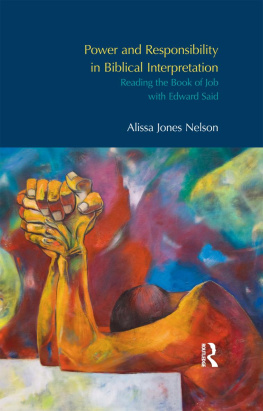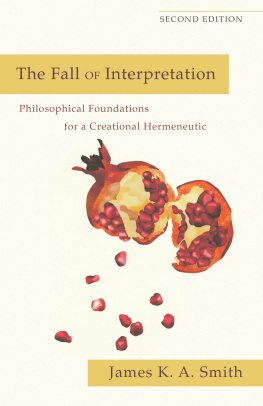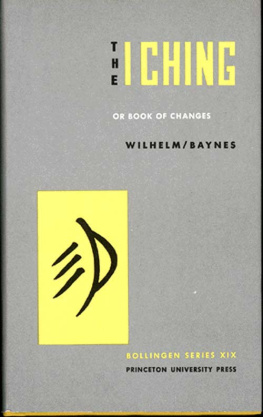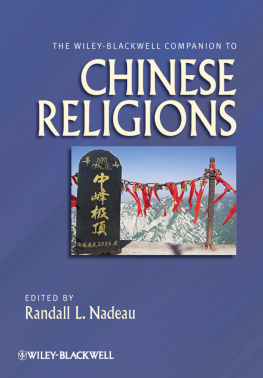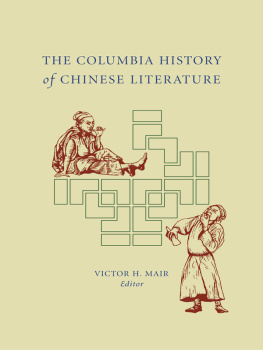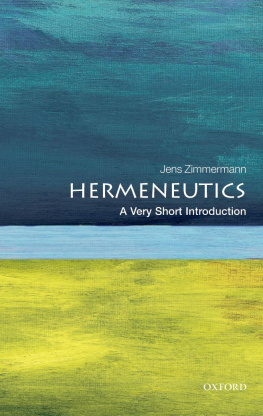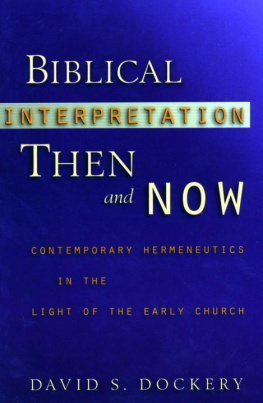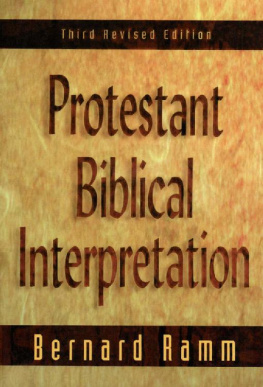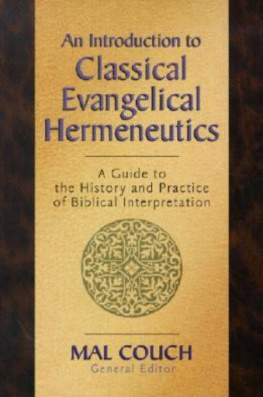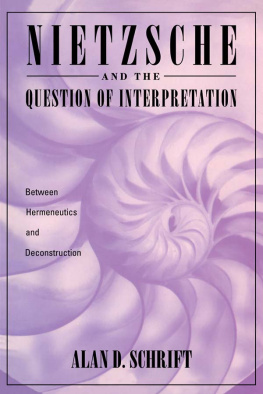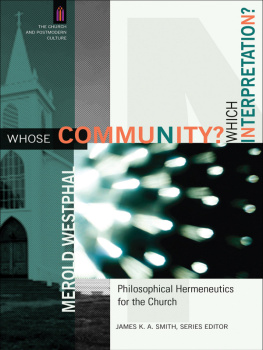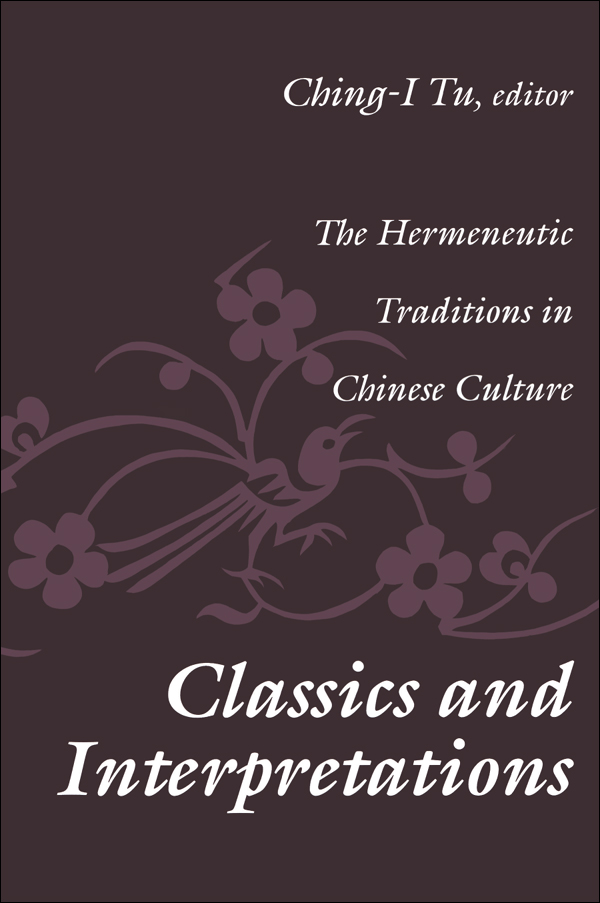
Classics and Interpretations
First published 2000 by Transaction Publishers
Published 2017 by Routledge
2 Park Square, Milton Park, Abingdon, Oxon OX14 4RN
711 Third Avenue, New York, NY 10017
Routledge is an imprint of the Taylor and Francis Group, an informa business
Copyright 2000 by Taylor & Francis
All rights reserved. No part of this book may be reprinted or reproduced or utilised in any form or by any electronic, mechanical, or other means, now known or hereafter invented, including photocopying and recording, or in any information storage or retrieval system, without permission in writing from the publishers.
Notice:
Product or corporate names may be trademarks or registered trademarks, and are used only for identification and explanation without intent to infringe.
Library of Congress Catalog Number: 99-41851
Library of Congress Cataloging-in-Publication Data
Classics and Interpretations : The Hermeneutic Traditions in Chinese Culture / edited by Ching-i Tu.
p. cm.
Papers presented at a conference convened at Rutgers University from October 10 to 12, 1996.
Includes bibliographical references and index.
ISSN 1-56000-431-2 (alk. paper)
1. Chinese classicsHistory and critism Congresses. I. Tu. Ching-i, dl935
PL2461.Z6C59 1999
895.1 '09dc21
99-41851
CIP
ISBN 13: 978-1-56000-431-8 (hbk)
As scholars have attempted new ways of interpretation and understanding, in recent years the discipline of hermeneutics, or the art and science of textual interpretation, has attracted much scholarly attention. Borrowed from students of the ever growing body of biblical interpretative literature that originated in the early Christian era, theoretical hermeneutics has provided many contemporary biblical and non-biblical scholars with important tools of textual interpretation. In a time when deconstructionist momentum has released scholars from prior and secure interpretational moorings, the emergence of theoretical hermeneutics has offered fresh approaches in a continuing search for textual meaning.
The central focus of hermeneuticsof any traditionis scripture. A text achieves scriptural status when it is canonized. The process of canonization, which itself intrinsically includes continuous sub-processes of reformation, is accompanied by the accumulation of commentaries appended to the scriptures. Invariably, commentaries play not only an exegetical but also an eisegetical function, wherein the authors of the commentaries, like the authors of the canons, cannot help but bring to the commentaries their own hermeneutical experience with both their historical context and the text they study.
In China, all three major schools of thought and belief, namely, Confucianism, Taoism, and Buddhism, have their own canons: the Confucians with their classics (the Five Classics and the Four Books), the Buddhists with their Tripitakas (Fo-tsang), and the Tao-ists with their Taoist Canon (Tao-tsang). One measure of the importance of individual works in a canon is the quantity of commentaries written on them. China has a long history of writing commentaries on important texts. Moreover, these texts were always studied together with their commentaries. Whether it is the Spring and Autumn, Analects, Too Te Ching, or Lotus Sutra, it has always been the practice among Chinese scholars to examine the text together with its commentaries and understand its meaning through this multifaceted exegetical prism. While a hermeneutic tradition has thrived in China for many centuries, this fact has largely been neglected by modem scholarship in the West.
It was in response to this neglect of so central a cultural concern of a society so large and important in our own world that many scholars from around the world convened at Rutgers University from October 10 to 12, 1996. At this conference, the scholars sought to shed light on the hermeneutical issues involved in the development and continuation of the Confucian canon and, necessarily, the Confucian culture.
The conference originally intended to center on three foci of scholarly inquiry, including Chinese hermeneutics as politics, as apology, and as personal spiritual development. Because of the scholarly imagination of the participants, as the conference evolved it covered a much broader scope of concerns, which the reader will find condensed in the papers contained in the present volume.
While a good number of the papers maintain focus on the rich hermeneutic traditions comprising particularly the Neo-Confucian texts, persons, and cultures, others search outside of these traditions in an attempt to understand the role of hermeneutics in Taoist and Buddhist textual interpretation, in Chinese poetics and painting, and in contemporary Chinese culture. The advantage of this diverse representation is that the reader is introduced not merely to the great breadth and depth of Chinese hermeneutics, but also to its tremendous length and evolutionary vigor. As scholars continue to clarify the components of this tradition, we may refine our understanding of the Chinese canonical tradition. Twenty-one papers presented at the conference are included in this volume and divided into seven sections.
In the initial section, The Great Learning and Hermeneutics, John Berthrong attempts to demonstrate how Chu Hsi employed the commentary form to define through the Great Learning (Ta-hseh) text the way in which the individual creates his social self and thereby expands the Tao. Chung-ying Cheng intends to show how Chu Hsis and Wang Yang-mings differing interpretations of the Ta-hseh text result ultimately from their distinct onto-hermeneutical predispositions, and that at the level of ontological truth their differences can be justified in a greater truth that encompasses both approaches to the text. In his article, Kai-wing Chow tells us how the treatment of the Ta-hseh text as either canonical or forgery depends largely on prevailing hermeneutical principles which in turn are based on disparate ideologies.
In the section on Canonicity and Orthodoxy, John B. Henderson demonstrates how the Neo-Confucian canonical exegetes and polemicists focused on three central philosophical touchstones to either define Confucian tenets more clearly or undermine polemical opponents more effectively. Yen-zen Tsai shows how the Han canonization of the Five Classics fully completed the intended role of the Classics by engaging their tao and that taos adherents politically. In his article, Thomas A. Wilson reviews the ways in which ones association with the dominant Confucian hermeneutical regime of late imperial China influenced his examination and subsequent political success. He also shows how a double standard existed in this hermeneutical regime which served to strengthen the dominance of the regime. Finally, the very existence of the double standard prevented this regime from achieving a general hermeneutics, as defined by Wilhelm Dilthey.
The section on Hermeneutics as Politics include four articles. Julia Ching develops from early times through the early republican period the thesis that the classics (with commentaries) and scholars have engaged in a dialectic that has transformed both, producing in each the representative authority of the presumed authors of the core canons of the classical tradition, the ancient sages. The result is a body of accumulated but continuously changing wisdom that should continue to inspire new generations of scholarly exegetes.
Q. Edward Wang explores the dominant hermeneutic tradition in Chinese historiography, whereby the past is created in narrative and thus employed as a moral mirror for the present and future times. Sarah A. Queen shows how Tung Chung-shus reinterpretation in the first century B.C.E. of the
Next page

